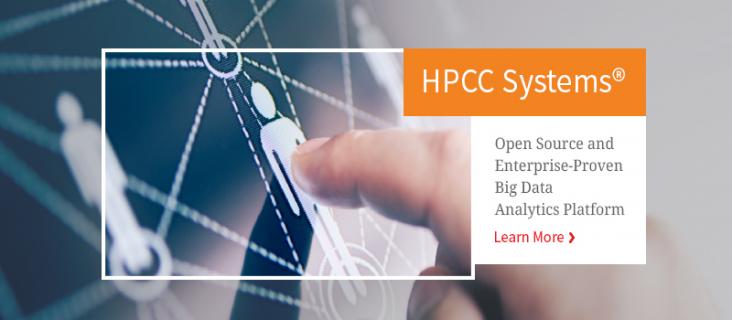
We’re passionate about helping students learn more about STEM, and through our academic program we give students the opportunity to collaborate on STEM-related projects involving innovative technologies like data analytics, robotics and AI. Since 2011, we have partnered with a number of universities to sponsor research projects, internships, robotics teams, scholarships, and other educational programs that provide students with access to hands-on learning and real-world engineering experience.

Born from the deep data analysis experience of LexisNexis® Risk Solutions, HPCC Systems® is a proven, open source solution for Big Data insights that can be implemented by businesses of all sizes. With HPCC Systems®, developers can design applications with Big Data at their core, enabling businesses to better analyze and understand data at scale. HPCC Systems® offers a consistent data-centric programming language, two processing platforms and a single, complete end-to-end architecture for efficient processing. Access to open source Big Data technology is vital for SDG 4 Quality education and SDG 9 Industry, innovation and infrastructure.
This study presents a deep learning framework using convolutional neural networks (CNNs) to efficiently replicate high-resolution outputs of conventional hydrological models for estimating groundwater head and surface water depth in the Sabgyo Stream Watershed, South Korea, achieving a 45-fold reduction in computation time compared to a physics-based model while demonstrating potential for predictive capabilities under future climate scenarios, although further improvements are needed for long-term accuracy.
This paper highlights the urgent need to enhance water system resilience in response to climate-induced scarcity, using a dynamic multisectoral model to analyze the macroeconomic impacts of temporary water shortages, revealing how firms' investment foresight influences their responses and the economy, with sector-specific insights indicating both negative impacts, particularly in agriculture and energy, and potential competitive benefits in certain sectors, ultimately recommending that firms prioritize anticipation and resilience-building measures across all sectors.

In this episode of the "World We Want" podcast, Márcia Balisciano interviews Dr. Ana Maria Porras, Assistant Prof of Biomedical Engineering, Crochet Artist, and Science Communicator. They discuss how biomedical engineering is helping develop better treatment strategies for tropical disorders, which have historically received very little attention.
Mitigating urban overheating is crucial for livable cities, yet this study of 7,500+ actions in 2,500+ European cities reveals a heavy focus on green and water solutions, limited use of smart systems, and gaps in addressing vulnerable populations and combinatorial strategies.
In the pursuit of improving engine performance and mitigating emissions, researchers have explored the intriguing domain of fuel blends incorporating butanol and gasoline. This innovative study aims to unravel the intricate dynamics between butanol and gasoline when utilized as a blended fuel in internal combustion engines. The current study integrates cutting-edge techniques such as Artificial Neural Networks (ANN) and Response Surface Methodology (RSM) for the optimization of engine performance.
The research questions explore the recent progress and technological advancements in Wireless Power Transfer (WPT), the reflection of global engagement within the WPT community through publication trends and geographical distribution, and the alignment of thematic clusters with SDG goals. Questions also investigate the contribution of AI to WPT, challenges and barriers to WPT adoption revealed by bibliometric analysis, ways WPT technology can democratize technology access in marginalized regions, and specific recommendations to ensure WPT technologies effectively accelerate progress towards achieving a broader set of SDGs.
This text ties into SDG 7 (Affordable and Clean Energy) and SDG 9 (Industry, Innovation, and Infrastructure). It focuses on the development and enhancement of inorganic multifunctional nanomaterials for energy applications, which are crucial for improving energy efficiency, storage, and conversion, thereby supporting sustainable energy solutions and innovative infrastructure development.
This chapter aligns with Goals 9, 11, and 13 by outlining nondestructive evaluation methods which extend the lifecycle of these buildings and make their materials more durable.
